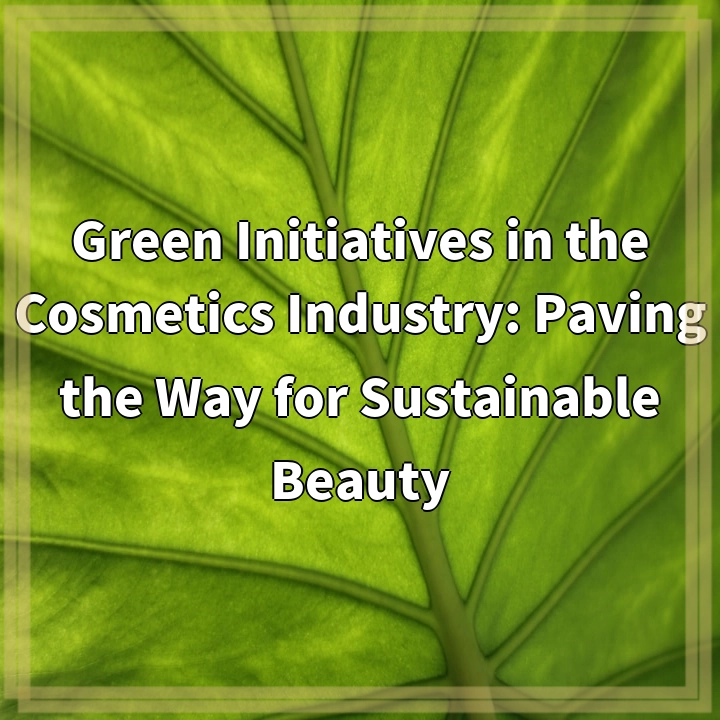
What it is:
The cosmetics industry is undergoing a significant transformation as more brands recognize the importance of sustainability. Green initiatives in this sector encompass a range of practices aimed at minimizing the environmental impact of beauty products. These initiatives focus on using eco-friendly ingredients, sustainable packaging solutions, and ethical sourcing methods. By adopting these practices, cosmetic companies not only contribute to environmental conservation but also meet the growing consumer demand for products that are safer for both people and the planet.
Eco-Friendly Ingredients
Many cosmetics brands are now prioritizing the use of natural and organic ingredients sourced from sustainable farms. This shift helps reduce reliance on synthetic chemicals that may harm the environment and consumer health. For example, brands are increasingly using plant-based alternatives to traditional ingredients, ensuring their products are biodegradable and less harmful to aquatic life.
Sustainable Packaging Solutions
Another crucial aspect of green initiatives in the cosmetics industry is the move towards sustainable packaging. Brands are exploring alternatives to single-use plastics by employing materials like glass, recycled paper, and compostable containers. Creative solutions such as refillable packaging and concentrated formulas also help decrease waste, encouraging consumers to think critically about their purchasing habits.
Real-World Problems
Despite the positive strides being made, the cosmetics industry faces several real-world challenges in the implementation of green initiatives. One significant issue is the lack of transparency in supply chains. Many consumers are unaware of the sourcing practices behind their favorite brands, making it difficult to identify truly sustainable options. This opacity can lead to greenwashing, where companies falsely claim to be eco-friendly to attract consumers.
Consumer Misunderstanding
Another challenge is the consumer perception of green products. While awareness of sustainability has grown, many people are still skeptical about the effectiveness and affordability of eco-friendly beauty products. Often, consumers believe that sustainable options sacrifice quality for environmental benefits, which can hinder their willingness to switch from conventional products.
Regulatory Hurdles
The cosmetics industry is also confronted with regulatory challenges. While some countries have established strict guidelines for sustainability, others lack comprehensive legislation, allowing for inconsistencies in product claims and standards. This disparity makes it challenging for brands to navigate compliance and discourages smaller companies from adopting green practices due to the complexity of regulations.
Resource Limitations
Lastly, the transition to sustainability can require significant investment in research and development, which can be a barrier for small and mid-sized companies. Limited resources may prevent these businesses from innovating or adopting green initiatives, thus reinforcing the dominance of larger corporations that can afford to implement extensive sustainability programs.

Solutions to Green Initiatives in the Cosmetics Industry
Addressing the challenges faced by the cosmetics industry in implementing green initiatives requires a multifaceted approach. By fostering transparency, educating consumers, navigating regulatory hurdles, and supporting smaller brands, the industry can make meaningful progress toward sustainability.
Enhancing Supply Chain Transparency
To combat greenwashing and build consumer trust, cosmetics companies must prioritize transparency in their supply chains. This can be achieved by providing detailed information about ingredient sourcing, production processes, and environmental impact. Brands can utilize certifications and third-party audits to showcase their commitment to sustainability, helping consumers make informed choices.
Consumer Education and Engagement
Educating consumers about the benefits and effectiveness of eco-friendly products is crucial. Brands can launch campaigns that highlight the positive impacts of sustainable beauty on health and the environment. Sharing testimonials, conducting workshops, and leveraging social media can help bridge the gap between consumer skepticism and the reality of green beauty products.
Advocating for Regulatory Support
Cosmetic companies should advocate for clearer regulations surrounding sustainability claims. By working with industry organizations and governmental bodies, brands can help establish comprehensive guidelines that promote fair marketing practices and set consistent standards for green products. This collaborative effort will create a more level playing field for all brands, especially smaller businesses.
Supporting Small and Sustainable Brands
Encouraging support for small and mid-sized cosmetics brands that prioritize sustainability is essential. Larger companies can collaborate with these smaller enterprises to share knowledge, resources, and innovations. Additionally, consumers can make a significant impact by choosing to purchase from brands committed to green practices, thereby driving demand for sustainable options.















